Search the Special Collections and Archives Portal
Search Results

Chet Buchanan oral history interview: transcript
Date
Archival Collection
Description
Oral history interview with Chet Buchanan conducted by Barbara Tabach on November 28, 2017 for the Remembering 1 October Oral History Project. Chet Buchanan begins this interview with a discussion of his move to Las Vegas, Nevada in 1999 after he was offered a job as a radio show host for 98.5 KLUC. He talks about the specifics of his job, including his career background as well as the Chet Buchanan Toy Drive. For this interview, he specifically goes into detail on his coverage of the Las Vegas October 2017 mass shooting and discusses being in San Diego, California at the time, yet still striving to reach people through his broadcast with the help of CBS San Diego. Throughout the interview, Buchanan examines his desire to make a difference in the community with his show and his interactions with the public.
Text

Transcript of interview with Lyn Robinson by Barbara Tabach, September 18, 2014
Date
Archival Collection
Description
One day in 2012, UNLV student Lyn Robinson spied a posting on the bulletin board for a photographer for the Sperling Kronberg Mack Holocaust Resource Center. She was an art major with a concentration on photography. She was also had a deep appreciation of the horror of the Holocaust and what the survivors she would take photos of had endured. Thus began a two year project, during which she took photos of over sixty survivors. Her images are preserved at UNLV Special Collections & Archives. Prints are displayed at the Sperling Kronberg Mack Holocaust Resource Center. On September 18, 2014, Lyn shared her work for this oral history recording. She is a native of Florida, daughter of a horticulturist father and pianist mother.
Text

Transcript of interview with Paul Bowerman by Frances Harelik, March 5, 1976
Date
Archival Collection
Description
Text
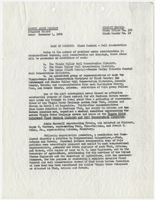
County agent project progress report, Flood control - soil conservation and soil conservation-domestic allotment, November 1, 1939
Date
Archival Collection
Description
Discussion of the formation of the Virgin River Watershed Flood Control District and Soil Conservation Committee and the efforts of all the individual soil conservation districts. Project Number: State Office No. 172. Clark County No. 12 and Project Number: State Office No. 284. Clark County No. 24
Text
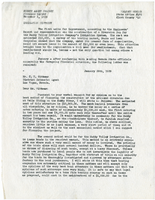
County agent project progress report, Irrigation district, November 1, 1929
Date
Archival Collection
Description
Progress report with copies of relevant correspondence regarding the creation of an irrigation district in the Moapa Valley. Project Number: State Office #172, Clark County #12
Text
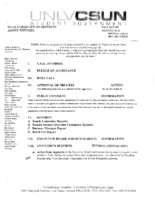
Meeting minutes for Consolidated Student Senate, University of Nevada, Las Vegas, June 24, 2006
Date
Archival Collection
Description
Text
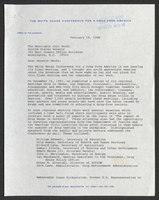
White House Conference for a Drug Free America: correspondence
Date
Archival Collection
Description
Folder of documents from the Senator Chic Hecht Political Papers (MS-00003) -- Subject Files -- Judiciary file.
Text
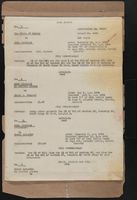
Stewart family real estate documents
Date
Archival Collection
Description
Stewart family real estate documents
Text
Florence Lee Jones and John Cahlan Papers
Identifier
Abstract
The Florence Lee Jones and John Cahlan Papers (1929-1983) contain material created by the couple related to their work at the
Archival Collection
